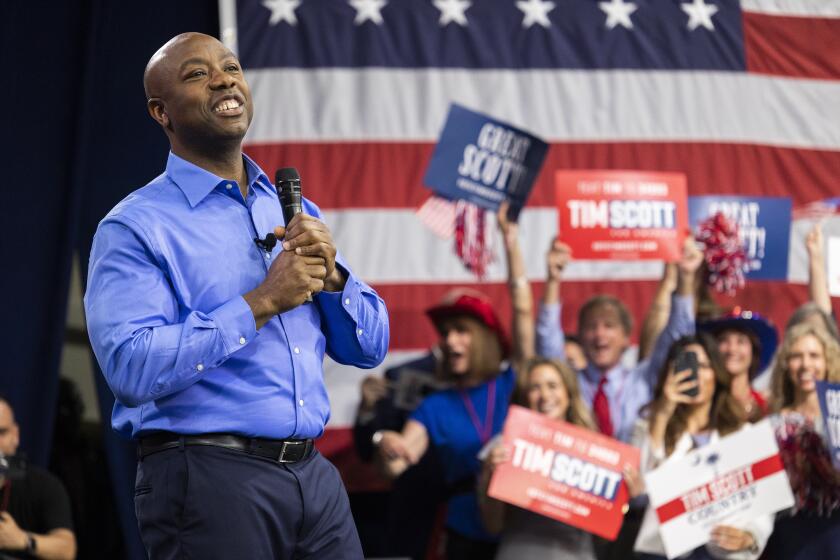Opinion: Why Trump’s childish bullying of his Republican opponents works

- Share via
“Congratulations to Nikki Haley for following President Trump’s lead and doing a CNN town hall. Ron DeSanctimonious is too chicken to ever do something like this.” — @TrumpWarRoom
Here, in microcosm, is the dysfunction plaguing the GOP presidential field, thanks to the Trumpian captivity.
As with most Trumpian pronouncements, there’s no policy and no principle to be found — other than the insinuation that Trump is courageous and his opponents are cowards. Ron DeSantis gets the text: He’s “chicken”; Haley the subtext: She’s simply following the Alpha Dog’s “lead,” as if the former South Carolina governor and United Nations ambassador wouldn’t have had the fortitude to do a CNN town hall without the benefit of Trump’s pathbreaking courage.
For what it’s worth, the only thing that Haley’s Sunday night CNN town hall had in common with Trump’s performance last month is that they were on the same network. Haley was generally polite, polished and coherent.
It’s all so exhaustingly childish, made all the more exhausting because it works.
Tim Scott, Ron DeSantis and other Republican candidates need to reeducate voters if they want a chance at beating the former president in the primary.
The Trump campaign’s theory of the race is simply an extension of Trump’s worldview — that politics isn’t primarily about ideas or policy but bullying and intimidation. Trump acts like the Biff Tannen character from “Back to the Future” (not entirely coincidentally, as Biff’s character was reportedly based on Trump), who dominates the nerds and normal kids alike by his sheer willingness to be an immature jerk.
For months now, Trump’s been testing out a slew of low-brow nicknames for Ron DeSantis, from “Rob” to “Meatball Ron,” on the theory that name calling is more effective than any policy position.
And, so far, he’s right.
DeSantis’ announcement on Twitter may have been an unforced error, but it didn’t prevent him from having a successful debut tour through Iowa and New Hampshire. But, so far, the polls have not significantly budged.
DeSantis is trying to take the high road. “I think it’s so petty. I think it’s so juvenile. I don’t think that’s what voters want. And, honestly, I think that his conduct, which he’s been doing for years now … that’s one of the reasons he’s not in the White House now. Because I think he alienated too many voters for things that really don’t matter. So I don’t get in the gutter for any of that,” DeSantis said on a New Hampshire radio station.
DeSantis is, of course, correct. If Trump could have shown a modicum of presidential restraint and maturity when he was in the White House — particularly during the pandemic — he probably wouldn’t have lost. That’s the subtext of DeSantis’ frequent refrain, about being a “winner” and the need to ditch the “culture of losing.”
DeSantis is working on the quaint assumption that Republican voters care more about winning than about watching Trump’s schtick. Haley and most of the other contenders have similarly endearing assumptions that base voters prioritize policy or positivity about America and the future.
Even Vivek Ramaswamy, who appeared on ABC’s “This Week” to trot out the insipid and insidious idea that America should hand Russia a military victory, nonetheless works on the assumption that appealing to ideas is a winning strategy.
The beer boycott tanked Bud Light’s sales and stock price. But ‘anti-woke’ activists don’t need that kind of payoff to keep stoking LGBTQ+ outrage.
It reminds me of the old story about Adlai Stevenson’s remark about running for president in the 1950s. When told, “Every thinking person in America will be voting for you.” Stevenson reportedly replied, “I’m afraid that won’t do — I need a majority.”
It’s not that Trump voters don’t care about ideas — good or bad — or even winning. The problem is their emotional attachment to Trump, an attachment that virtually all of his opponents let fester and harden for years. The result is a deeply ingrained and even more deeply debased conception of leadership and masculinity, one that confuses boorishness for “winning.”
Mike Pence, who filed the paperwork for his presidential bid on Monday, is a case in point. As Trump’s vice president, Pence loyally defended his boss’ asininity for four years — until he hit the breaking point on Jan. 6, 2021. He nobly did the right thing that day, but even when it comes to Trump’s effort to steal the election — which torched America’s ability to boast about the peaceful transfer of power — his tone has been more in sorrow than in anger.
Politicians are understandably reluctant to tell voters they’re wrong. But hinting at their wrongness isn’t very effective, either. It is translated as deference to a high school bully and that’s disastrous for any candidate trying to seem like a leader.
More to Read
A cure for the common opinion
Get thought-provoking perspectives with our weekly newsletter.
You may occasionally receive promotional content from the Los Angeles Times.













